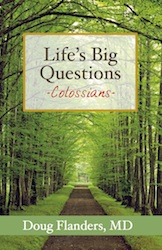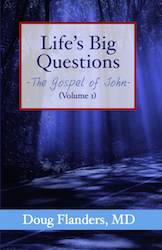
Photo Source: https://www.pexels.com/photo
For many years, my widowed grandmother lived next door to a kindly older Hispanic man. They both loved to garden and would talk to one another over the fence that separated their backyards as they would tend to their tomato plants or bean stalks. Then one day, a swarm of police cars descended upon the elderly neighbor’s home and my grandmother’s friend was led away in handcuffs.
She later found out that he was the head of the Mexican Mafia in the large city where they lived. Imagine her dismay to discover that her gentle gardening buddy was in reality a ruthless crime boss who had been linked to over one hundred murders. His life of crime had finally caught up with him.
While I was in medical school, the wife of one of my friends was hospitalized with a nervous breakdown. In the ensuing weeks, my friend discovered that his wife was not an only child, as she had led him to believe, but in fact had several siblings from whom she had been long estranged.
Neither was she an orphan. Her parents were alive and well and living in the same city, although my friend had never been introduced, having been told that they were dead.
My friend ended up dropping out of school in order to take a job that would provide medical insurance with mental health coverage for his wife. They didn’t have any children, and since their marriage was predicated on a lie, I asked him what he planned to do.
His answer was perfect: “Well, I married her for better or for worse. I guess this is just the ‘worse’ part.”
In high school, I waited tables for a restaurant in a shopping mall. The mall closed at nine, but I would usually stay for another twenty or thirty minutes to clean up the place before heading home. Since my parents went to bed at ten each night, “working late” became the catchall excuse I used when pursuing a number of activities my preacher father would never have approved.
Sometimes I would go see the latest rated-R movie. Sometimes I would swing by my girlfriend’s house to hang out for a little while. Sometimes I would go to a party and have a few drinks with my friends.
This “white lie” became a regular way of life, until I finally left for college. Because my parents trusted me, they never caught me in my nearly daily ritual of deception.
- Can you think of some famous deceivers you have read about, perhaps a murderer who lived under an assumed identity for years? How were they eventually caught? Did some of them show relief at no longer having to live a lie?
- Has anybody you know ever been victimized by a deceiver, such as an unfaithful spouse or an embezzling employee? Were they devastated by the discovery? How did they resolve the situation? Did the relationship survive? If so, was complete trust ever restored?
- How important is trust in a marriage relationship? Can you love someone you distrust? What if your partner is distrustful of you, does that put a strain on things?
- How important is trust in a work relationship? Should you be able to trust your business partners? Your accountant? Your lawyer? Your doctor? Your minister? What should you do if that trust is betrayed?
When I met my wife in college, she was very straight-laced and proper, so I didn’t really want to divulge my less-than-stellar background to her. Virtually all of my friends advised me “the past is in the past” and “what she doesn’t know can’t hurt her.”
As I mulled over these clichés of common wisdom, I decided I could not enter such an important relationship with anything less than absolute honesty. Sometimes the truth hurts—it certainly did in this case—but my wife and I worked through it before we wed, and our marriage has been stronger for having been founded on the truth.
Still, it wasn’t until our oldest son was diagnosed with diabetes at the age of two that we began to take a hard look at all of our relationships, beyond our marriage. In the process of examining our hearts in the midst of this trial, we were convicted that we had not been completely honest with our parents and a few others on a number of issues (including those frequent false claims of working late), and we felt compelled to set things right.
It was an awkward and humbling process, but it was ultimately very freeing. We learned an important lesson:
when you have no secrets, you have no fear.
Anxiety and worry simply melt away. Complete honesty has been our policy ever since and is one of the key elements to our health, happiness, and success.
In John 8:31-38, Jesus utters the famous phrase, “You will know the truth, and the truth will make you free.” (John 8:32, NASB)
The Jews, undoubtedly remembering how their ancestors had been enslaved in Egypt many centuries before, indignantly insisted that they were not slaves to anybody. But Christ was not referring to Egypt—or to Babylon or Assyria or even the Roman occupation of the time. He was referring to something far more important and more fundamental than who collected the taxes or maintained the roads.
- What type of slavery was Christ referring to in this passage? (See John 8:34)
- How is slavery to sin similar to actual slavery? How is it different?
- Have you ever seen someone who was clearly enslaved to a particular sin? Was it sad to watch? Did they want to be set free, or had their bonds become a source of security and identity to them?
- Is the truth about being enslaved to sin a universal truth that applies to all people at all times, even if the details vary?
- Is the universal truth about Christ’s love and forgiveness available for all people at all times, regardless of the details of their sin?
- Have you appropriated the truth of Christ’s love and forgiveness to the reality of your own sinfulness?
- Are you currently living a life of deception with God, with yourself, or with others? Are there some things that need to be set right?
The Truth is, we are all sinners in need of God’s Grace.
When we claim that Grace for ourselves, we put things right with God and are set eternally free. Furthermore, by walking in truth and living in openness and honesty, we can put things right with our fellow man and find freedom in this life as well.
NOTE: 
 This post is adapted from my Life’s Big Questions Series, which encourages readers to examine all of life’s questions in the light of Scripture. Whether used for personal devotions, as family discussion guides, or in a study group, this series provides an invaluable resource for enhancing your spiritual walk.
This post is adapted from my Life’s Big Questions Series, which encourages readers to examine all of life’s questions in the light of Scripture. Whether used for personal devotions, as family discussion guides, or in a study group, this series provides an invaluable resource for enhancing your spiritual walk.